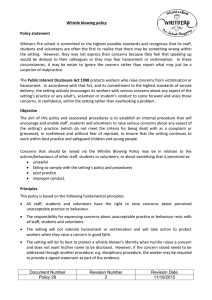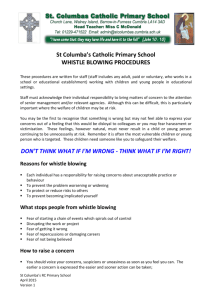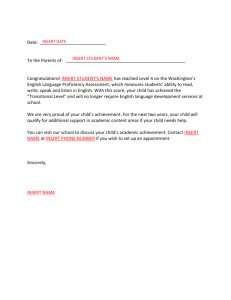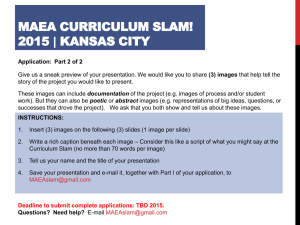Whistle-blowing model policy
advertisement
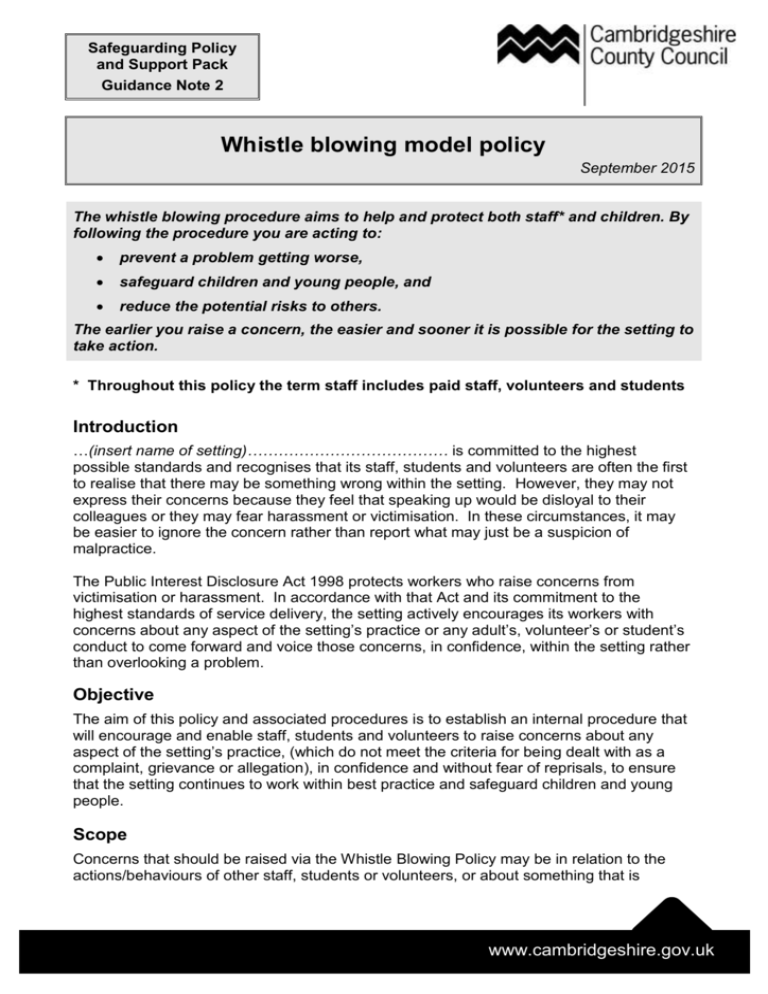
Safeguarding Policy and Support Pack Guidance Note 2 Whistle blowing model policy September 2015 The whistle blowing procedure aims to help and protect both staff* and children. By following the procedure you are acting to: prevent a problem getting worse, safeguard children and young people, and reduce the potential risks to others. The earlier you raise a concern, the easier and sooner it is possible for the setting to take action. * Throughout this policy the term staff includes paid staff, volunteers and students Introduction …(insert name of setting)………………………………… is committed to the highest possible standards and recognises that its staff, students and volunteers are often the first to realise that there may be something wrong within the setting. However, they may not express their concerns because they feel that speaking up would be disloyal to their colleagues or they may fear harassment or victimisation. In these circumstances, it may be easier to ignore the concern rather than report what may just be a suspicion of malpractice. The Public Interest Disclosure Act 1998 protects workers who raise concerns from victimisation or harassment. In accordance with that Act and its commitment to the highest standards of service delivery, the setting actively encourages its workers with concerns about any aspect of the setting’s practice or any adult’s, volunteer’s or student’s conduct to come forward and voice those concerns, in confidence, within the setting rather than overlooking a problem. Objective The aim of this policy and associated procedures is to establish an internal procedure that will encourage and enable staff, students and volunteers to raise concerns about any aspect of the setting’s practice, (which do not meet the criteria for being dealt with as a complaint, grievance or allegation), in confidence and without fear of reprisals, to ensure that the setting continues to work within best practice and safeguard children and young people. Scope Concerns that should be raised via the Whistle Blowing Policy may be in relation to the actions/behaviours of other staff, students or volunteers, or about something that is www.cambridgeshire.gov.uk 2 perceived as: unlawful failing to comply with the setting’s policy and procedures poor practice improper conduct. Principles This policy is based on the following fundamental principles: All staff, students and volunteers have the right to raise concerns about perceived unacceptable practice or behaviour. The responsibility for expressing concerns about unacceptable practice or behaviour rests with all staff, students and volunteers. The setting will not tolerate harassment or victimisation and will take action to protect workers when they raise a concern in good faith. The setting will do its best to protect a whistle blower’s identity when he/she raises a concern and does not want his/her name to be disclosed. However, if the concern raised needs to be addressed through another procedure, e.g. disciplinary procedure, the worker may be required to provide a signed statement as part of the evidence. In some circumstances the setting may have to disclose the identity of the worker without his/her consent, although this will be discussed with the worker first. Appropriate advice and support will be made available to staff, students and volunteers who raise concerns. Those who raise concerns will be kept informed of the progress and outcome of any investigation. The setting will not tolerate malicious allegations, this may be considered as a disciplinary offence. Procedures Procedures for reporting and investigating ‘whistle blowing’ concerns have been developed to ensure that: Staff, students and volunteers can raise concerns (no matter how small they may appear) internally as a matter of course, and receive feedback on any action taken. Concerns are taken seriously and dealt with quickly and appropriately. Staff and volunteers are reassured that they will be protected from reprisals or victimisation for whistle blowing in good faith. Staff and volunteers can take the matter further if they are dissatisfied with the setting response and seek external advice and guidance. Issues raised are addressed via other procedures and policies as appropriate, e.g. safeguarding policy, allegations against an adult working in a setting, grievance, disciplinary, health and safety. Appropriate records are maintained for monitoring purposes. Raising a Concern Safeguarding Policy and Support Pack for early years and childcare settings – Guidance Note 2: Whistle blowing model policy 3 Staff, students and volunteers should raise concerns with the manager or management committee. Concerns should be raised in writing and include: reference to the fact that it is a whistle blowing disclosure the background and history of the concerns names, dates and places (where possible) the reasons why the individual is concerned about the situation. Staff who feel unable to put concerns in writing, can telephone or meet either the manager or a member of the management committee. Who should you contact? You should contact one of the following people in confidence: Insert names and contact details of committee/manager below (Insert name and contact details) (Insert name and contact details) (Insert name and contact details) Investigation The action taken will depend on the nature of the concern. All matters raised, with the exception of allegations of abuse against a staff member, or unlawful activity, will be investigated internally. The appropriate person/s will investigate the concerns thoroughly, ensuring that a written response can be provided within ten working days. The response should include details of how the matter was investigated, conclusions drawn from the investigation, and whom to contact should the staff member be unhappy with the response and wish to raise the matter. If the investigation cannot be completed within the timescale above, the staff member should receive a response that indicates: progress to date how the matter is being dealt with how long it will take to provide a final response. In order to protect individuals, initial enquiries (usually involving a meeting with the individual raising the concern), will be made to decide whether an investigation is appropriate and, if so, what form it should take. Concerns or allegations that raise issues that fall within the scope of other policies/procedures, will be addressed under those procedures. Some concerns may be resolved at this initial stage simply, by agreed action or an explanation regarding the concern, without the need for further investigation. If you do not feel that the complaint has been dealt with effectively or you still have concerns, you have a right to refer your concerns to Ofsted. Allegations of abuse against adults who work or volunteer in the setting Safeguarding Policy and Support Pack for early years and childcare settings – Guidance Note 2: Whistle blowing model policy 4 If an allegation is made against a staff member or volunteer, the following action will be taken (as per the ‘Allegations of Abuse against Adults who Work or Volunteer in a Childcare Setting’ flowchart and guidance): The setting will ensure the immediate safety of the children. The setting will not investigate and immediately contact the Early Years Named Senior Officer (if the Early Years Named Senior Officer is not contactable, the Local Authority Designated Officer (LADO) should be contacted direct). The setting will notify Ofsted of a significant incident. The Early Years Named Senior Officer will notify the LADO, who will decide if it could be a child protection concern. If the LADO decides that there is a child protection concern, external/internal agencies (e.g. police) will be informed by the LADO and the setting will act upon the advice given to ensure that any investigation is not jeopardised. It may be necessary for the employer to suspend the alleged perpetrator. Suspension is a neutral act to allow a thorough and fair investigation. If it is agreed that there is not a child protection concern, the setting will investigate further and feed back the outcome of the investigation to the Early Years Named Senior Officer and Ofsted. Adoption and annual review of the policy This policy was adopted at a meeting of: held on: Signed on behalf of the Management Committee / Proprietor: (insert name of setting) (insert meeting date) (insert signature) (insert role of signatory) This policy was reviewed on: (insert date) (insert signature) This policy was reviewed on: (insert date) (insert signature) This policy was reviewed on: (insert date) (insert signature) Useful contacts Early Years Named Senior Officer (Gemma Hope) 01223 714760 or 07876 038762 Local Authority Designated officer (LADO) 01223 727967 Ofsted 0300 123 1231 Safeguarding Policy and Support Pack for early years and childcare settings – Guidance Note 2: Whistle blowing model policy

